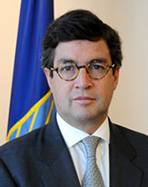 Luis Alberto Moreno
Luis Alberto Moreno
Record-strength hurricanes, submerged coastal cities, scorched dust bowls – these are the sort of apocalyptic images that are often used to illustrate the devastating consequences of climate change. But for millions of farmers in Latin America and the Caribbean, a slow-motion catastrophe is already underway.
A fungus known as rust, or roya in Spanish, is attacking coffee plantations from Mexico to Peru. Scientists blame the rapid spread of the disease – which suffocates trees by coating their leaves – on climate change. Rust thrives when it rains often and temperatures are unusually warm – conditions that are occurring more frequently in these coffee-growing regions.
Most of the discussion at the United Nations Climate Change Conference in Paris has focused on what will happen after 2020, when any agreement that is reached would come into effect. But coffee rust is destroying livelihoods even as the negotiators speak. The crisis illustrates the burden developing countries face as they try to meet their people’s hopes for higher living standards and their international commitments to decarbonize their economies. Addressing it will require the same broad cooperation and decisive action that other climate-related challenges will demand over the coming decades.
In Central America, per capita greenhouse-gas emissions are between one-fifth and one-tenth of those in industrialized countries. Governments in the region are pledging to cut emissions by as much as 25% by 2030, and to implement other measures to mitigate and adapt to climate change; overall, these efforts are expected to require at least $4 billion a year in investments. By comparison, replacing blighted coffee trees with rust-resistant varieties would cost an estimated $1 billion.
The article’s full-text is available here.











